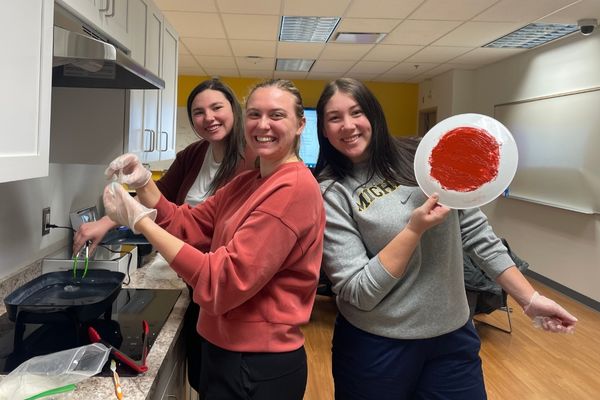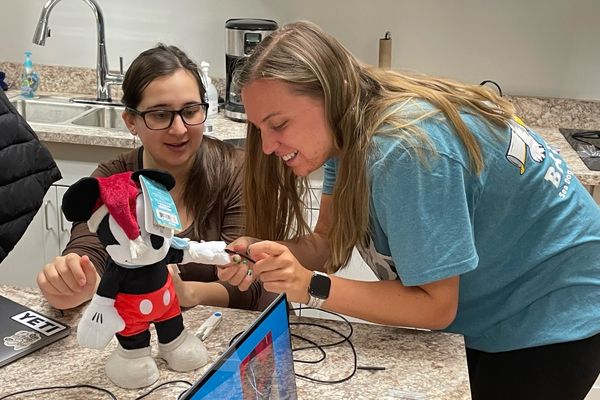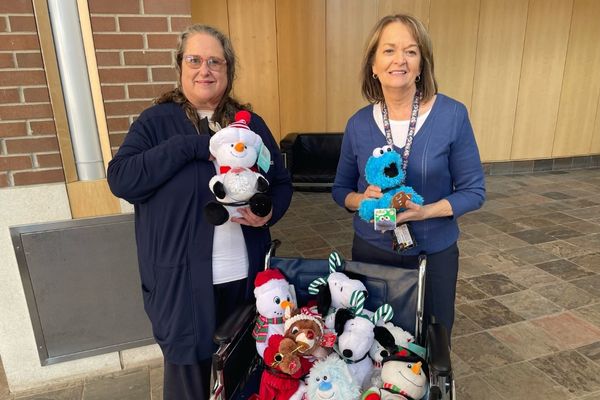UM-Flint occupational therapy students create low-cost adaptive products for the community

Occupational therapists focus on helping people with disabilities or illness perform activities that bring meaning to their lives. In the University of Michigan-Flint's occupational therapy doctorate program, students learn to be effective therapists by participating in meaningful activities themselves.
One "case" in point is the innovations and technology class taught by Donna Case, assistant professor of occupational therapy, where second-year students build assistive technologies to help patients be more independent. Students make non-skid plates, weighted utensils and toothbrushes with adaptive handles for patients with Parkinson's disease who are experiencing tremors. The products are then donated to the Michigan Parkinson Foundation for use by their members.
Students also adapt toys with electronic switches that make them sing or dance to increase accessibility. The toys made this semester were donated to the Genesee Intermediate School District for use in their early intervention program.
"The skills we are learning in this lab help us think about cost-effective and creative ways to increase our clients' ability to function in their environment," said Elizabeth Mansfield, a second-year student from Boyne Falls. "I learn best when I have the opportunity to be hands-on. It is much more engaging to be creating assistive technology instead of just talking about it."

Case believes that UM-Flint is one of only a few OT programs where students are building adaptive solutions in this way.
While adaptive products can be purchased, they are often expensive. Case said that all of the solutions she teaches students to create are affordable and can be easily replicated, such as adding nonstick adhesive to plates or making adaptive handles for toothbrushes out of plastic crafting pellets.
"When our students become therapists and are working in the field, there often isn't a budget for these types of technologies," she said. "I want them to look at materials they can find in the world that aren't currently being used for people with disabilities and repurpose them to open up opportunities for people."
Case challenges her students, while they are out on their fieldwork assignments, to look for problems that patients may encounter and to find solutions with the products available in the innovations and technology lab.
"It is important to give students these tools," she said. "They can then go out and share these skills with patients and other therapists. If you have a favorite coffee mug but are having a hard time holding on to it, we can help you adapt it. That's really powerful."

Case said that the organizations they have donated the products to report that they are in-demand among their clients and students.
"The adaptive toys that we donate bring joy to children who often aren't able to play without the help of others," she said. "It is amazing to see kids find something that they can do for themselves instead of waiting for an adult to come and play with them."
The OT program recently purchased a 3D printer and Case is working with a student to use it to create adaptive technologies.
"As occupational therapists, we have to think about what we can do with patients that is going to be the most meaningful," Case said. "What are the barriers that keep people from doing what gives their life meaning? Technology allows us to level the playing field."
To learn more about UM-Flint's occupational therapy program, visit its webpage.
Related Posts
No related photos.
Martha Pennington
Martha Pennington is the communications specialist for the College of Health Sciences. She can be reached at mkpennin@umich.edu.